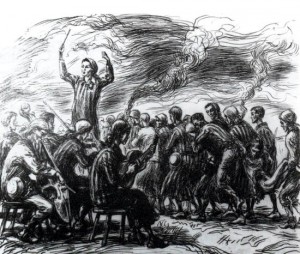The Womens orchestra of Auschwitz is a group of Jewish musicians women musicians, a form of protection from the death. This orchestra was created in June 1943 on the order of the Schutzstaffel (from German « squadron of protection »); for three years they played one hundred and fifty different pieces of music like, for example, the Johann Strauss’s beautiful blue Danube, the Hungarian dances of Johannes Brahms, and many others…
 Drawing of Mieczyslaw Koscielniak illustrating
Drawing of Mieczyslaw Koscielniak illustrating
The womens orchestra of Auschwitz giving the rhythm to the workers.
This orchestra was composed of a lot of different sorts of instruments like the violin, the cello, the piano, the flute, the drums, voices…
The aim of this group of musicians was to:
- play marches to give a rhythm to the Kommando, the workers, to accompany them in the mornings in their job
- be a distraction from the SS in the evenings
- give representations every Sunday afternoon
The orchestra was first managed by Zofia Czajkowska; who was a music professor in Poland. At her death in august 1943, Alma Rosé became the new chief of the orchestra, was a Jew Austrian violinist who managed the group of women until April 1944. The last manager was Sonia Vinogradova.
At the end of the war a lot of these women confessed that “music saved them” which means that if they weren’t musicians, and if they didn’t play in this orchestra, they probably wouldn’t have survived the Shoah.
Soizic Delsalle
Ce matin du 8 mai, une excellente émission sur France Culture autour du livre de Pierre-Emmanuel Dauzat et Hélios Azoulay, « L’enfer a aussi son orchestre, la musique dans les camps », aux éditions Vuibert.
À réécouter !
« Ce livre est l’histoire inimaginable des musiques nées dans l’enfer des camps nazis.
On y rencontre des femmes, des hommes et des enfants au bord d’un abîme d’où la musique a surgi, leur donnant parfois la force de vivre ou de résister.
À l’opposé, il y a les SS trahissant la musique et l’utilisant pour anéantir plus encore.
Ce récit sensible et émouvant ressuscite pour la première fois un aspect méconnu de l’histoire de la Shoah. Et comme la musique est le chemin le plus pur de l’âme au cœur, on ressort bouleversé de cette lecture.
Un CD de l’Ensemble de musique incidentale accompagne cet ouvrage. En annexe, un chef-d’oeuvre inédit de Viktor Ullmann écrit en déportation. »
Je ne connaissais pas l’existence de cet orchestre, merci !
Je comprends bien que la musique fut salvatrice pour elles, c’est le genre de « détail » qui peut tout changer quand on vit l’horreur. Peut-être que ça nous rappelle notre capacité à nous élever intellectuellement et spirituellement, quand les événements nous ramènent à nos besoins primitifs de survivre, et que les tortionnaires tentent de nous enlever notre humanité…
Wow c’est bien celles qui occupaient la petite place vers l’entrée du camp ?
Oui je crois..